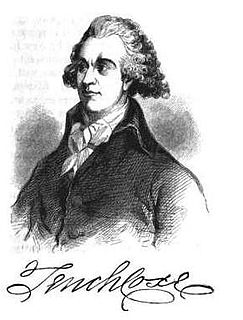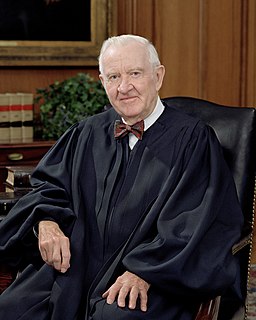A Quote by Patrick Henry
Have we the means of resisting disciplined armies, when our only defense, the militia, is put in the hands of Congress? Of what service would militia be to you when, most probably, you will not have a single musket in the state? For, as arms are to be provided by Congress, they may or may not provide them.
Related Quotes
The powers of the sword are in the hands of the yeomanry of America from sixteen to sixty. The militia of these free commonwealths, entitled and accustomed to their arms, when compared with any possible army, must be tremendous and irresistible. Who are the militia? Are they not ourselves? Is it feared, then, that we shall turn our arms each man against his own bosom. Congress has no power to disarm the militia.
The President, and government, will only control the militia when a part of them is in the actual service of the federal government, else, they are independent and not under the command of the president or the government. The states would control the militia, only when called out into the service of the state, and then the governor would be commander in chief where enumerated in the respective state constitution.
First, the constitution ought to secure a genuine and guard against a select militia, by providing that the militia shall always be kept well organized, armed, and disciplined, and include, according to the past and general usuage of the states, all men capable of bearing arms; and that all regulations tending to render this general militia useless and defenceless, by establishing select corps of militia, or distinct bodies of military men, not having permanent interests and attachments in the community to be avoided.
It is not certain that with this aid alone [possession of arms], they would not be able to shake off their yokes. But were the people to posses the additional advantages of local governments chosen by themselves, who could collect the national will, and direct the national force; and of officers appointed out of the militia, by these governments and attached both to them and to the militia, it may be affirmed with the greatest assurance, that the throne of every tyranny in Europe would be speedily overturned, in spite of the legions which surround it.
Who are the militia? They consist now of the whole people, except a few public officers. But I cannot say who will be the militia of the future day. If that paper on the table [the Constitution] gets no alteration, the militia of the future day may not consist of all classes, high and low, and rich and poor.
Are we at last brought to such humiliating and debasing degradation that we cannot be trusted with arms for our defense? Where is the difference between having our arms in possession and under our direction, and having them under the management of Congress? If our defense be the real object of having those arms, in whose hands can they be trusted with more propriety, or equal safety to us, as in our own hands?
When I joined the Supreme Court in 1975, both state and federal judges accepted the Court's unanimous decision in United States v. Miller as having established that the Second Amendment's protection of the right to bear arms was possessed only by members of the militia and applied only to weapons used by the militia.
With 450,000 U. S. troops now in Vietnam, it is time that Congress decided whether or not to declare a state of war exists with North Vietnam. Previous congressional resolutions of support provide only limited authority. Although Congress may decide that the previously approved resolution on Vietnam given President Johnson is sufficient, the issue of a declaration of war should at least be put before the Congress for decision.
A well-regulated militia, composed of the body of the people, trained to arms, is the proper, natural, and safe defense of a free state; that standing armies, in time of peace, should be avoided as dangerous to liberty; and that in all cases the military should be under strict subordination to, and governed by, the civil power.
What plan for the regulation of the militia may be pursued by the national government is impossible to be foreseen...The project of disciplining all the militia of the United States is as futile as it would be injurious if it were capable of being carried into execution... Little more can reasonably be aimed at with the respect to the people at large than to have them properly armed and equipped ; and in order to see that this be not neglected, it will be necessary to assemble them once or twice in the course of a year.
If we were living back in 1789, your musket would be really useful in a military conflict. If you were called up to service, they said bring your musket. And indeed, the First Congress passed a law. You want to know the first gun control law in America? First Congress passed a law mandating that all able-bodied men must own a musket.
I am for relying for internal defense on our militia solely till actual invasion, and for such a naval force only as may protect our coasts and harbors from such depredations as we have experienced; and not for a standing army in time of peace which may overawe the public sentiment; nor for a navy which, by its own expenses and the eternal wars in which it will implicate us, will grind us with public burthens and sink us under them.
The constitution ought to secure a genuine militia and guard against a select militia. ...All regulations tending to render this general militia useless and defenseless, by establishing select corps of militia, or distinct bodies of military men, not having permanent interests and attachments to the community ought to be avoided.


























